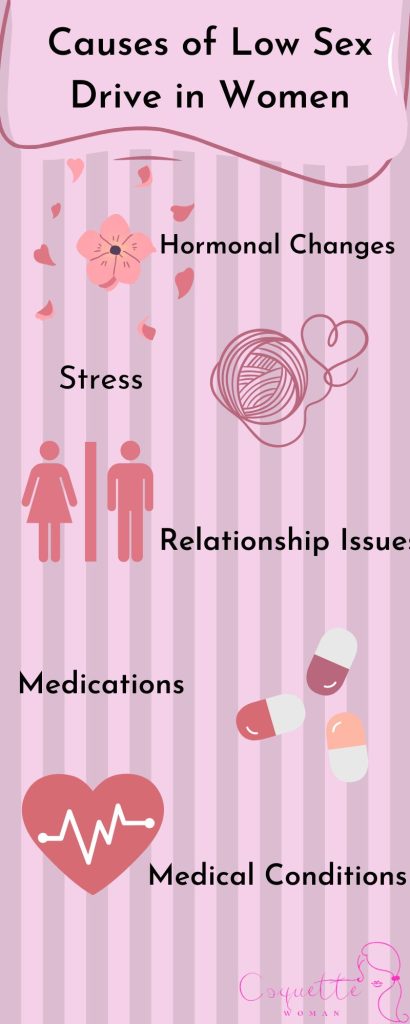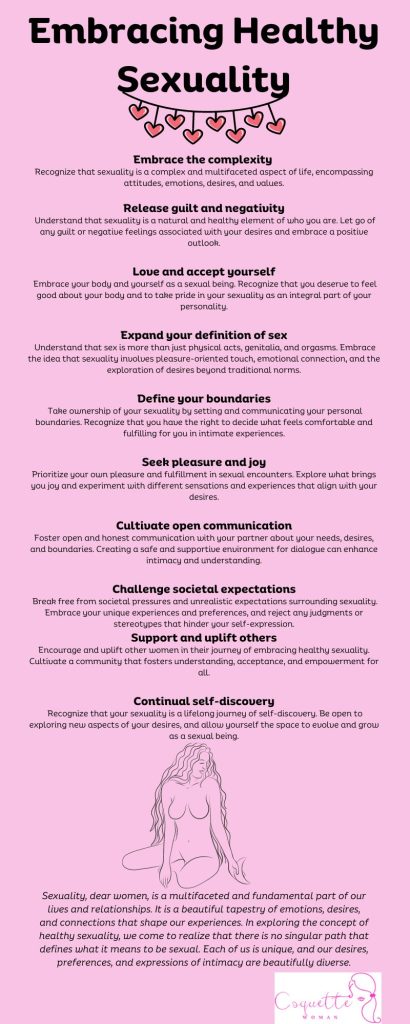
Are you struggling with a lack of sexual desire while your partner feels neglected and frustrated? You’re not alone. It’s a common issue that can cause tension and strain in relationships. But ignoring the problem won’t make it go away. That’s why it’s essential to understand the root causes and explore ways to address the issue. In this article, we’ll delve into the factors that contribute to low sex drive, how to communicate effectively with your partner, when to seek professional help, and self-care strategies to help you rediscover your sexual desire. So, let’s get started on this journey towards a fulfilling and satisfying sex life.
You don’t have sexual desire and your husband is crazy about sex?
Fifty percent of married couples experience sexual dysfunction or dissatisfaction.
Inhibited sexual desire and discrepancies in desire are the most common complaints, so you have plenty of company.
One spouse (usually the male) initiates and encourages sexual contact, so even if dysfunctional or unsatisfying, marital sex continues.
Interesting, but many women with desire problems do not have difficulty with arousal and orgasm once they begin.
As one woman said,
“Once stimulation starts, I get turned on and come; it’s wanting to be sexual that stymies me.”
Experts call it “lack of wanta.”
Romantic love is inherently unstable, usually ending before marriage or seldom lasting past the first year. Sexual chemistry is very explosive and equally short-lived. Couples report “hot” sex at the beginning when they see each other on weekends, but experience sexual disappointment when living together or married.
Understanding low sex drive
Understanding the factors that contribute to low sex drive is the first step toward addressing the issue. Women and men can both experience a decrease in sexual desire, but the underlying causes can be different. For women, hormonal changes, stress, and relationship issues are common culprits. Men may experience low sex drive due to medical conditions, medication side effects, or psychological factors. Additionally, differences in sex drive between partners can create tension in relationships. It’s important to recognize that various medical conditions, such as diabetes, heart disease, and depression, can also affect sexual desire. By understanding the root causes of low sex drive, you can take steps to address them and reignite the passion in your relationship.

Causes of low sex drive in women
- Hormonal changes: Fluctuations in estrogen and testosterone levels can affect a woman’s libido. Menopause, pregnancy, and breastfeeding are all times when women may experience hormonal changes that decrease their desire for sex.
- Stress: High levels of stress can make it difficult to feel sexually aroused. This can be due to the physical effects of stress, such as fatigue and tension, as well as the emotional toll it takes on a person.
- Relationship issues: Problems in a relationship, such as unresolved conflicts or a lack of emotional connection, can negatively impact a woman’s desire for sex.
- Body image: Women who are self-conscious about their bodies may feel less confident in their sexuality and have a lower sex drive.
- Medications: Certain medications, such as antidepressants and birth control pills, can lower sex drive as a side effect.
- Medical conditions: Chronic pain, endometriosis, and other medical conditions can make sex painful or uncomfortable, leading to a decrease in sexual desire.
- Fatigue: Exhaustion from work, caregiving, or other responsibilities can leave women feeling too tired for sex.
It’s important to note that there is no one-size-fits-all answer to low sex drive, and often, it is caused by a combination of factors. Seeking professional help and open communication with your partner can help identify the root cause of your low sex drive and develop strategies to address it.
“Where did the passion go?”
Hot sex based on romantic love and passion disappears, as it should.
These cannot maintain desire. Sexual desire is based on emotional and sexual intimacy, not on romantic love or passionate sex.
Comfort, attraction, and trust nurture desire after the heat of sexual chemistry is long gone.
The prescription for maintaining sexual desire is integrating intimacy, non-demand pleasuring, and erotic scenarios and techniques.
Lack of desire: when it’s okay
Occasional lack of desire is normal.
At times, it is healthy.
You wonder about women who have a high sexual desire in times of couple conflict, dealing with an ill child, after a funeral, facing a financial crunch, or during a work crisis.
It is unhealthy to use sex as a way of denying or avoiding reality.
It is normal to occasionally have differences in desire.
Sometimes one partner wants a hug, the other wants an orgasm.
What is not normal is chronic inhibited desire, a no-sex or low-sex marriage, or constant conflict over sex.
Components of sexual functioning
Healthy sexual functioning allows both of you to enjoy pleasure.
The four components of sexual functioning are:
1. Desire — Positive anticipation and feeling that you deserve sexual pleasure.
2. Arousal — Being receptive and responsive to touching and genital stimulation.
3. Orgasm — Letting go and allowing arousal to naturally culminate in orgasm.
4. Satisfaction — Feeling emotionally and physically bonded after a sexual experience.
Realistic expectations help you to enjoy a sexual experience
A key element is having realistic expectations, and accepting the inherent variability and flexibility of sexual experiences.
Novels and movies emphasize free-flowing, nonverbal, powerful sexuality where desire is intense. Arousal is quick, orgasm always occurs for both (simultaneously), and it is marvelous. This sells movies and novels, well, but makes real women like us feel inadequate and deficient.
If you experience desire, arousal, orgasm, and satisfaction twice a month, you can count yourself lucky and should celebrate those special times.
Less than half the sexual experiences of well-functioning couples involve equal desire, arousal, and orgasm.
As a rule, one partner is less involved in sex, although the other enjoys this experience.
Between 5 and 15 percent of sexual experience is mediocre, unsatisfactory, or unsuccessful.
This is also normal.

Healthy sexuality concept
Sexuality is a complex, crucial aspect of life and marriage.
There is no “one right way” to be sexual.
Ideas that promote healthy sexuality
- Sex is more than genitals, intercourse, and orgasm. Sexuality involves attitudes, feelings, perceptions, and values. Sexuality is a natural, healthy element in life. It need not be a source of guilt or negative feelings.
- Sexuality is an integral aspect of your personality. You deserve to feel good about your body and yourself as a sexual person.
- The essence of sexuality is giving and receiving pleasure-oriented touching.
- Express sexuality so that it enhances your life and your intimate relationship.
A woman’s sexuality provides a solid foundation for marriage
Women who believe that the way to rebuild desire is to rekindle romantic love and reignite sexual passion are heading into a dead end. The keys to revitalizing marital sexuality are building bridges to desire, increasing intimacy, enjoying non-demand pleasuring, and creating erotic scenarios.
You need to learn to facilitate and reinforce the other’s sexual feelings and desires, rather than colluding in sexual avoidance.
Maintaining comfort, attraction, and trust is an active process.
Learn to take the initiative and design a pleasurable or erotic scenario. You are open and receptive.
Remember, Inhibition and avoidance are confronted. This requires commitment and working together. Change is usually gradual, rather than dramatic.
There will be difficulties, setbacks, disappointments, and lapses, but if you stay with the process, you will succeed.
Once sexuality is reestablished, you need to generalize and maintain gains. Benign neglect subverts sexual desire.
Relapse prevention is an active process. Good intentions and loving feelings are necessary, but not sufficient, to maintain a vital sexual bond.
A marriage that meets the needs for intimacy and security is of great value. The marital bond of respect and trust motivates the couple to revitalize sexual intimacy. When respect and trust are lacking, trying to restore intimacy is a useless struggle.
A no-sex or low-sex marriage robs a couple of intimate feelings, especially when affection and sensuality are absent. Unless this changes or there are other sources of satisfaction, the marriage probably will not survive. The marriage might have genuine strengths, but the inability to resolve sexual problems overwhelms the relationship.
Is your “no sex drive” problem a symptom or a cause?
The question of whether a marital problem causes a sexual problem or the sexual problem causes marital dissatisfaction is more than a chicken-and-egg argument.
Human behavior is overdetermined, with many causes and many dimensions. Any simple answer is likely to be wrong or, at least, incomplete.
Sexuality is a positive, integral component of marital intimacy. Although no-sex or low-sex marriages can function satisfactorily, these are the minority. Some couples maintain a respectful, trusting bond and are good parents even though sexuality is dysfunctional or absent. Other couples have an angry, alienated, nonsupportive marriage, and the only thing that works is sex.
The most common pattern is a couple that has a good relationship but struggles unsuccessfully with inhibited desire.
Over time, the sexual problem becomes severe and chronic. Sexual problems undermine marriages by robbing them of intimate connection and energy. The sexual problem increasingly defines the marriage; blaming and resentment build. In well-functioning marriages, sexuality plays a 15 to 20 percent role in terms of vitality and satisfaction. With a chronic inhibited desire problem, sexuality plays an inordinately powerful role, draining positive feelings and tearing at the marital fabric.
Relationship conflicts and low sex drive
Another pattern is that relationship conflicts, especially those involving anger, are played out through sexual conflict.
Anger is the main cause of secondary inhibited sexual desire.
Withholding or avoiding sex makes a statement, a way to fight back.
By the way, this is a usual female reaction.
Anger can involve a sexual issue (demand for oral sex, a discovered extramarital affair, conflict over birth control), but more often anger involves a relationship problem.
Common causes of anger may be concern about drinking and driving, not feeling supported in a family conflict, out-of-control arguments that include slapping and pushing, conflicts over spending, and feeling that your spouse is taking advantage of you. As alienation increases, “hot” angry thoughts build on themselves.
Attempts to bridge the emotional gap with affectionate touching or sexual activity are met with angry rebuffs, increasing frustration, and isolation.
Emotional and sexual distance feeds the angry cycle.
And you find yourself trapped in an alienated low-sex or no-sex marriage.
Fertility problems
Fertility problems are a common cause of inhibited sexual desire. Sex with the intention of becoming pregnant is an aphrodisiac.
For 85 percent of couples under 30 and 70 percent of couples over 30, becoming pregnant is usually easy (often, too easy).
Couples in the unlucky minority find that as time goes on, frustration builds. The process of undergoing a fertility assessment, with increasingly intrusive, painful, and expensive tests and interventions, weakens the desire of the most ardent couple.
Fertility problems are no fun. Self-blame and blaming the spouse are easy traps.
Fertility problems can bring out the worst in people. Infertility dominates self-esteem, marriage, and sexuality. They stop being sexual except during the high probability week.
Sex becomes a pressured performance to achieve pregnancy, with little pleasure, warmth, or feeling of connection. Couples dealing with a fertility issue need a great deal of support, which includes using touching, sensuality, and eroticism to energize themselves during the non-high probability periods of the month.
Conflict about intercourse frequency
Another problematic pattern is a conflict about intercourse frequency.
Instead of broad-based pleasuring and a variety of bridges to desire, it is a “yes—no” question—are we going to have intercourse?
If not, there is no touching. If every touch is a demand for intercourse, the pressure is up and the pleasure is down.
Emotional intimacy and non-demand pleasuring are sacrificed to intercourse pressure. The result is inhibited desire. Intimacy, comfort, and pleasure lead to sexual anticipation. Conflict and pressure lead to inhibited desire.
Quality is more important than frequency. Sexuality is more than genitals, intercourse, and orgasm.
Guidelines that promote desire include the beliefs that touching is valued for itself, touching occurs both inside and outside the bedroom, and not all touching must result in intercourse.
Sexuality is complex, with many causes and dimensions
INHIBITED SEXUAL DESIRE and no-sex or low-sex drive are not caused by one factor. Sexuality is complex, with many causes and dimensions.
Sexual desire and desire problems are best understood as a couple’s issue. This facilitates a comfortable, productive way to think about, discuss, address, and enhance sexual desire. The couple approach is especially valuable when considering what maintains, as opposed to what caused, inhibited sexual desire.
Regardless of what originally caused the problem, you become stuck in a self-defeating cycle. It is considerably easier to break this cycle if you approach and talk about sexual desire as a couple’s issue, not only yours.
The traps of guilt and blame help maintain this as a chronic sexual problem that is a drain on your marital bond.
Viewing inhibited sexual desire as a couple’s problem reduces guilt, defensiveness, and blaming. Sexuality as a couple’s issue is one of the most helpful, yet hardest-to-accept, guidelines.
However, when you encounter inevitable setbacks, frustrations, and disappointments, it is easy to revert to blaming. It is easier to blame your spouse than to be responsible for and change your own attitudes and behavior.
A core concept in couple therapy is to take responsibility for yourself. You are not responsible for your spouse. Focus on making personal changes in attitudes, behaviors, and feelings— this takes thought, work, and discipline. It is neither your responsibility nor your role to change your spouse.
Navigating low sex drive with your partner
Effective communication with your partner is crucial when dealing with low sex drive. Here are some details on how to approach this sensitive issue with your partner:
Importance of open and honest communication:
It’s essential to have an open and honest conversation with your partner about your low sex drive. Your partner may feel neglected, frustrated, or even rejected, and it’s important to understand their perspective. By being honest about how you feel and listening to their concerns, you can work together to find a solution that works for both of you.
Tips for discussing the issue with your partner:
Approach the conversation with empathy and understanding. Choose a time and place where you won’t be interrupted or distracted. Use “I” statements instead of “you” statements to express your feelings without placing blame. Be specific about what you need, such as more non-sexual physical affection, a break from sexual expectations, or more emotional support.
Addressing your partner’s concerns and frustrations:
It’s crucial to acknowledge your partner’s feelings and validate their concerns. Let them know that you understand how they feel and that you want to work together to find a solution. Encourage them to share their thoughts and feelings without judgment or defensiveness.
Exploring alternative ways of physical intimacy:
Low sex drive doesn’t necessarily mean the end of physical intimacy in a relationship. Explore alternative forms of physical intimacy, such as cuddling, kissing, or massage, that don’t necessarily lead to sex. Physical touch can be a powerful way to connect emotionally and physically with your partner, even if sex isn’t on the table.
In summary, communication is key when dealing with low sex drive in a relationship. By approaching the conversation with empathy, understanding, and a willingness to listen, you can work together with your partner to find a solution that works for both of you. Don’t be afraid to explore alternative forms of physical intimacy and remember that satisfying sex life isn’t the only way to connect with your partner.
FAQ Section
Question: What should I do when I have no sex drive and my spouse does?
It can be challenging when there are differences in sex drive within a relationship. Open and honest communication is key. Start by discussing your feelings with your spouse, expressing your concerns and any underlying factors that may be affecting your sex drive. Consider seeking professional help, such as therapy or medical advice, to explore potential physical or psychological reasons for the decrease in libido. Together, explore alternative ways to foster intimacy and connection that go beyond sexual activity, such as emotional bonding and non-sexual physical touch. Remember, finding a balance that respects both partners’ needs is important.
Question: Can lack of sex make a man angry?
The impact of a lack of sex on a person’s emotions can vary greatly. For some individuals, the frustration and unfulfilled desires may contribute to feelings of anger or resentment. However, it is essential to recognize that anger is a complex emotion and can be influenced by various factors within a relationship. Open and honest communication about sexual needs, desires, and expectations can help address the issue and find ways to meet both partners’ needs in a way that is mutually satisfying.
Question: Is it normal for a wife to have no sex drive?
It is not uncommon for individuals, including wives, to experience fluctuations in their sex drive. Factors such as stress, hormonal changes, medication, relationship dynamics, or underlying physical or psychological conditions can impact libido. It is important to approach the situation with empathy and understanding. Openly communicate with your partner about your feelings and concerns, and consider seeking professional advice if needed. Remember, each person’s experience is unique, and finding a solution that works for both partners is crucial.
Question: Why is my wife not interested in sex anymore?
There can be various reasons why a wife may lose interest in sex. Physical factors such as hormonal changes, fatigue, medication side effects, or underlying health conditions may play a role. Psychological factors like stress, relationship issues, body image concerns, or emotional disconnection can also contribute. It is essential to approach the topic with sensitivity and have an open and non-judgmental conversation with your wife. Encourage her to express her feelings and concerns, and consider seeking professional help, such as couples therapy or medical advice, to address the underlying issues and work towards a solution together.
Question: How often should a couple have sex?
The frequency of sexual activity in a relationship varies greatly and depends on the desires and needs of each partner. There is no “normal” or set number that applies universally. It is crucial for couples to have open and honest communication about their sexual desires, expectations, and any discrepancies in libido. Finding a balance that respects both partners’ needs and desires is key. Some couples may prefer more frequent intimacy, while others may be satisfied with less frequent encounters. The key is to establish a mutual understanding and foster a satisfying sexual connection that works for both partners.
Question: How long is too long without sex in a relationship?
The length of time without sex that is considered “too long” can vary for different couples. It depends on the unique dynamics, desires, and expectations within the relationship. Some couples may experience periods of decreased sexual activity due to various factors, while others may place a higher importance on regular intimacy. If either partner feels unsatisfied or distressed by the lack of sexual activity, it is important to address the issue through open communication, understanding, and potentially seeking professional help if needed. Ultimately, finding a balance that works for both partners and fosters a fulfilling relationship is crucial.
The Worst Thing a Husband can say to his Wife: Marriage Killer Phrase





One thought on “I have no sex drive and my husband is mad”